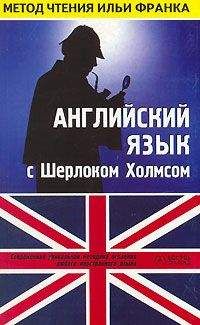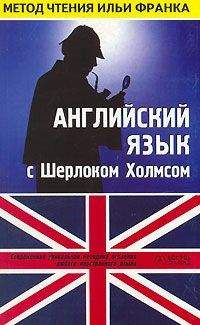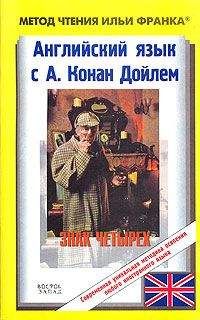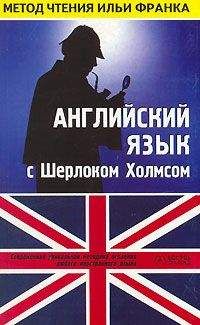“There is the man who set me in the right path,” said he.
“Come now, Bannister,” said Holmes. “It will be clear to you, from what I have said, that only you could have let this young man out, since you were left in the room, and must have locked the door when you went out. As to his escaping by that window, it was incredible. Can you not clear up the last point in this mystery, and tell us the reasons for your action?”
“It was simple enough, sir, if you only had known, but, with all your cleverness, it was impossible that you could know. Time was, sir, when I was butler to old Sir Jabez Gilchrist, this young gentleman’s father. When he was ruined I came to the college as servant, but I never forgot my old employer because he was down in the world. I watched his son all I could for the sake of the old days. Well, sir, when I came into this room yesterday, when the alarm was given, the very first thing I saw was Mr. Gilchrist’s tan gloves a‑lying in that chair.
“I knew those gloves well (я хорошо знал те перчатки), and I understood their message (и понял, что они означают: «их сообщение»). If Mr. Soames saw them, the game was up (если бы мистер Сомс увидел их, игра бы закончилась = пиши пропало). I flopped down into that chair (я упал в это кресло; to flop — шлепаться, плюхаться; ударять, хлопать крыльями), and nothing would budge me until Mr. Soames he went for you (и ничто не сдвинуло бы меня с места = и сидел, не двигаясь, пока мистер Сомс не пошел за вами; to budge — шевелиться, двигаться; пошевельнуть, сдвинуть с места). Then out came my poor young master (затем из /спальни/ вышел мой бедный молодой хозяин), whom I had dandled on my knee (которого я /ребенком/ качал на коленях; to dandle — качать на руках или на коленях /ребенка/), and confessed it all to me (и во всем мне признался). Wasn’t it natural, sir, that I should save him (разве не естественно, сэр, что я должен был спасти его = как мне было не спасти его), and wasn’t it natural also that I should try to speak to him (и как не попытаться поговорить с ним) as his dead father would have done (как сделал бы его покойный отец), and make him understand that he could not profit by such a deed (объяснить ему, что не будет пользы от такого поступка; to profit — извлекать пользу)? Could you blame me, sir (можно меня винить /за это/, сэр)?”
“No, indeed (нет, конечно),” said Holmes, heartily, springing to his feet (от всего сердца сказал Холмс, вскакивая на ноги). “Well, Soames, I think we have cleared your little problem up (итак, Сомс, думаю, мы распутали ваше маленькое дело), and our breakfast awaits us at home (а нас дома ждет завтрак). Come, Watson (пойдемте, Ватсон)! As to you, sir, I trust that a bright future awaits you in Rhodesia (что касается вас, сэр, надеюсь, что блестящее будущее ожидает вас в Родезии; to trust — доверять/ся/; надеяться). For once you have fallen low (однажды вы совершили низкий поступок; to fall low — низко пасть). Let us see, in the future, how high you can rise (посмотрим, как высоко вы сможете подняться в будущем).”
knee [ni:], natural ['n&tS(@) [email protected]], future ['fju: [email protected]]
“I knew those gloves well, and I understood their message. If Mr. Soames saw them, the game was up. I flopped down into that chair, and nothing would budge me until Mr. Soames he went for you. Then out came my poor young master, whom I had dandled on my knee, and confessed it all to me. Wasn’t it natural, sir, that I should save him, and wasn’t it natural also that I should try to speak to him as his dead father would have done, and make him understand that he could not profit by such a deed? Could you blame me, sir?”
“No, indeed,” said Holmes, heartily, springing to his feet. “Well, Soames, I think we have cleared your little problem up, and our breakfast awaits us at home. Come, Watson! As to you, sir, I trust that a bright future awaits you in Rhodesia. For once you have fallen low. Let us see, in the future, how high you can rise.”
(второе пятно)
I had intended “The Adventure of the Abbey Grange” to be the last of those exploits of my friend, Mr. Sherlock Holmes (я решил, что «Дело аббатства Грейндж» будет последним из тех подвигов моего друга, мистера Шерлока Холмса; to intend — намереваться, предполагать; планировать; adventure — приключение; история), which I should ever communicate to the public (о которых я поведаю общественности; to communicate — говорить, сообщать/ся/). This resolution of mine was not due to any lack of material (это мое решение связано не с недостатком материала; resolution — решительность, решимость; /твердое/ решение, намерение; due to — благодаря; вследствие; в результате; из-за), since I have notes of many hundreds of cases (поскольку у меня есть записи о /многих/ сотнях случаев) to which I have never alluded (которые я никогда раньше не упоминал; to allude to — упоминать; ссылаться на /что-либо/), nor was it caused by any waning interest on the part of my readers (также оно не было вызвано ослабевающим интересом /со стороны/ моих читателей; to wane — идти на убыль, падать; уменьшаться; ослабевать) in the singular personality and unique methods of this remarkable man (к своеобразной личности и уникальным = необыкновенным методам этого замечательного человека).
The real reason lay in the reluctance (истинная причина заключается в нежелании; to lie in — заключаться в /чем-либо/: «лежать в») which Mr. Holmes has shown to the continued publication of his experiences (которое мистер Холмс проявил = в нежелании Холмса, чтобы его приключения продолжали появляться в печати; to continue — продолжать/ся/; publication — издание, публикация /книги, статьи и т. д./; оглашение; experience — /жизненный/ опыт; случай, приключение). So long as he was in actual professional practice (пока он занимался профессиональной практикой = пока он не отошел от дел; actual — фактический, действующий; текущий) the records of his successes were of some practical value to him (отчеты о его успехах представляли для него практическую ценность), but since he has definitely retired from London (но когда он окончательно покинул Лондон; definitely — определенно, точно; окончательно) and betaken himself to study and bee-farming on the Sussex Downs (и посвятил себя изучению и разведению пчел на холмах /графства/ Суссекс; to betake — обращаться, прибегать; вверять, поручать; to betake oneself to the studies — посвятить себя занятиям; bee-farming — пчеловодство; bee — пчела; farm — ферма, крестьянское хозяйство; the Downs — Даунс /меловые холмы в юго-восточной Англии, особенно в графстве Суссекс/), notoriety has become hateful to him (известность стала ему ненавистна; hate — ненависть), and he has peremptorily requested (и он настоятельно потребовал; peremptory — безапелляционный, не допускающий возражения; безоговорочный) that his wishes in this matter should be strictly observed (чтобы его пожелания по этому вопросу строго соблюдались; wish — просьба; /по/желание; to observe — наблюдать, замечать; соблюдать /законы, правила, обычаи/; твердо придерживаться).
resolution [, [email protected]'lu:S(@)n], unique [ju:'ni:k], reluctance [rI' [email protected]], notoriety [, [email protected]@' [email protected]], peremptorily [ [email protected]'rempt(@)rI]
I had intended “The Adventure of the Abbey Grange” to be the last of those exploits of my friend, Mr. Sherlock Holmes, which I should ever communicate to the public. This resolution of mine was not due to any lack of material, since I have notes of many hundreds of cases to which I have never alluded, nor was it caused by any waning interest on the part of my readers in the singular personality and unique methods of this remarkable man.
The real reason lay in the reluctance which Mr. Holmes has shown to the continued publication of his experiences. So long as he was in actual professional practice the records of his successes were of some practical value to him, but since he has definitely retired from London and betaken himself to study and bee-farming on the Sussex Downs, notoriety has become hateful to him, and he has peremptorily requested that his wishes in this matter should be strictly observed.
It was only upon my representing to him (только когда я объяснил ему; to represent — представлять; излагать, объяснять) that I had given a promise that “The Adventure of the Second Stain” should be published (что дал обещание, что /рассказ/ «История о втором пятне» будет опубликован) when the times were ripe (когда придет время; ripe — зрелый, созревший, спелый /о фруктах, зерне и т. п./; подошедший, пришедший /о времени/), and pointing out to him that it is only appropriate (и доказал ему, что будет очень уместно; to point out — обращать внимание, указывать; appropriate — подходящий; уместный) that this long series of episodes should culminate in the most important international case (если эта длинная серия эпизодов = цикл рассказов завершится самым важным международным делом) which he has ever been called upon to handle (каким ему когда-либо приходилось заниматься; to call upon — призывать, обращаться к кому-либо /за помощью/; to handle — обходиться, обращаться; справляться /с кем-либо, чем-либо/), that I at last succeeded in obtaining his consent (я наконец-то сумел получить его согласие) that a carefully guarded account of the incident should at last be laid before the public (что тщательно оберегаемый отчет об этом случае должен наконец стать известным публике = на опубликование этой истории, тщательно хранимой в тайне; to lay before smb. — представлять кому-либо, выносить на чье-либо рассмотрение). If in telling the story I seem to be somewhat vague in certain details (если во время рассказа я покажусь довольно неопределенным в некоторых деталях), the public will readily understand (читатели легко поймут; public — публика; общественность; определенный круг людей) that there is an excellent reason for my reticence (что существует веская причина для моей сдержанности; excellent — отличный, превосходный; reticence — молчаливость; сдержанность; скрытность).
It was, then, in a year, and even in a decade, that shall be nameless (в году и даже в десятилетии, которые будут неизвестными = год и даже десятилетие не могут быть указаны), that upon one Tuesday morning in autumn (однажды во вторник утром, осенью) we found two visitors of European fame (мы приняли двух посетителей, /пользующихся/ европейской известностью) within the walls of our humble room in Baker Street (в стенах нашей скромной комнаты на Бейкер-стрит). The one, austere (один /из них/, строгий), high-nosed (надменный: «с поднятым носом»), eagle-eyed (с орлиным взором), and dominant (властный; dominant — господствующий; главный, преобладающий; наиболее влиятельный), was none other than the illustrious Lord Bellinger (был не кто иной, как знаменитый лорд Беллинджер), twice Premier of Britain (дважды /занимавший пост/ премьер-министра Великобритании). The other, dark (второй, темный), clear-cut (с правильными чертами лица; clear-cut — ясно очерченный; четкий, ясный: «ясно вырезанный, скроенный»), and elegant, hardly yet of middle age (элегантный, едва ли достигший среднего возраста), and endowed with every beauty of body and of mind (одаренный красотой тела и /тонкостью/ ума; to endow — завещать; одарять, наделять), was the Right Honourable Trelawney Hope (был достопочтенный Трелони Хоуп; Right Honourable — достопочтенный /титулование пэров, министров, лордов и т.д./), Secretary for European Affairs (министр по европейским делам), and the most rising statesman in the country (самый многообещающий государственный деятель в стране; rising — возрастающий, увеличивающийся; приобретающий вес, влияние в обществе /о людях/).





